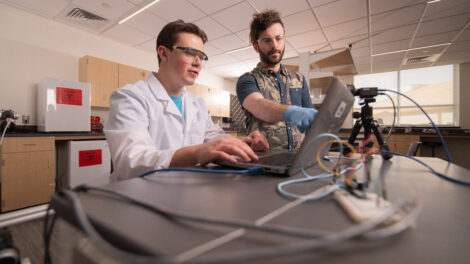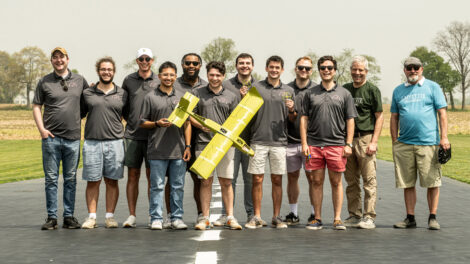Grandparents, grandkids, and Zoom
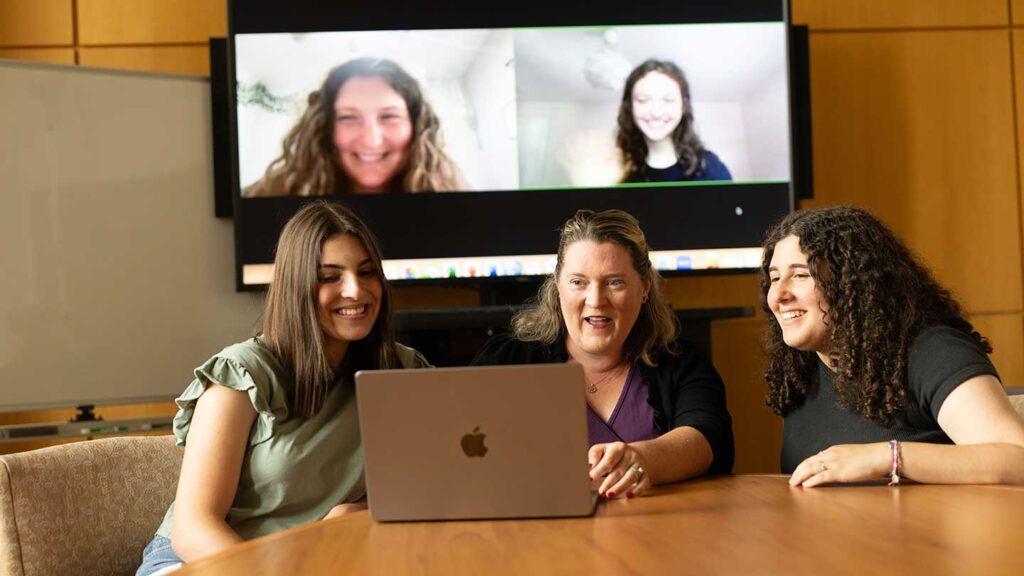
Photo by Adam Atkinson
By Stella Katsipoutis-Varkanis
As modern technology has become more deeply embedded into everyday life in many households, kids today have access to more digital content and communication channels than ever before. “It’s changing the landscape of child development,” says Lauren Myers, associate professor of psychology. “And while there are definitely ways digital media can be used to zone out, there are also many wonderful, rich ways to use it.”
This is what Myers and her four Lafayette student-researchers—EXCEL Scholars Caroline Hugo ’25, Hayley Katz ’25, Samantha Montague ’26, and Gabriela Pedulla ’26—are exploring in her Lafayette Kids Lab this summer. “The Grandparent-Grandchild Zoom Study,” which is part of a larger collaborative effort with a research team at University of South Dakota (USD), examines how families use video chat to interact across distance, and whether or not participating in structured activities during these sessions can help children and their family members feel more connected to one another.
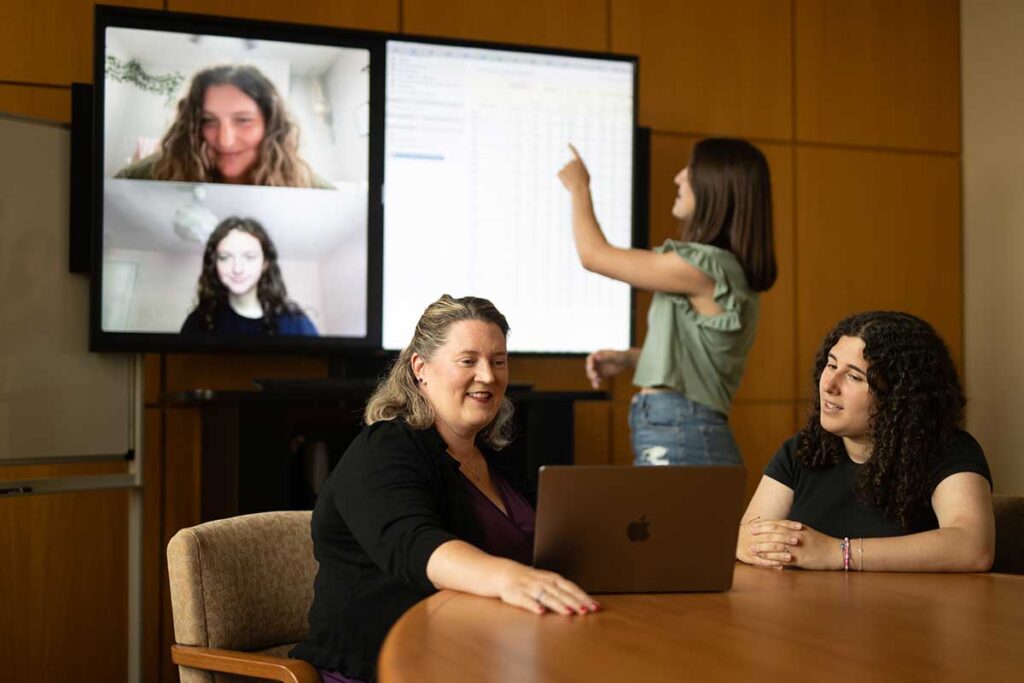
Gabriela Pedulla ’26 (back right) reviews the spreadsheet tracking families’ participation over time, as Prof. Lauren Myers (front left) discusses the project with Samantha Montague ’26 (front right), Hayley Katz ’25 (top Zoom), and Caroline Hugo ’25 (bottom Zoom). | Photo by Adam Atkinson
“Now more than ever, video chat is more necessary for a lot of families,” says Pedulla, a psychology and government and law major who joined the study this summer after learning about it in Myers’ Lifespan Development course. “Finding the best ways to optimize families’ experiences with it will help improve family interconnectedness—despite distance.”
Myers’ idea for the project was sparked 10 years ago, when her friend was looking for developmentally appropriate ways to help her toddler get to know his grandparents, who lived abroad. “My intuition was that video chatting with a grandparent is very different from screen time spent watching videos generated by an algorithm,” says Myers, who has spent her nearly 20-year career studying child development and learning. When Myers earned a grant from the National Institutes of Health in 2022, she began to put her theory to the test.
The three-year study, which Myers and her team will conclude in 2025, looks at individual family groups—consisting of a child between 18 months and 5 years old, parents, and grandparents—who participate in regular recorded Zoom sessions over the course of six to eight weeks. Depending on which condition they’re assigned to, the families are tasked with virtually engaging with each other in either playful activities, book-reading, or simple conversation. “We know that paying attention across the screen is challenging for children at the ages we’re looking at, so we’re trying to manipulate the environment to see if that facilitates focus and meaningful interaction,” Myers says. “We also ask families to fill out surveys directly before and after each Zoom call, where they describe how much they enjoyed the activity and how close they feel to one another.”
As Myers’ summer research assistants, Hugo, Katz, Montague, and Pedulla are playing a critical role in driving the study forward. In addition to leading introductory Zoom calls to help interested families understand what to expect from the project, Myers’ student-researchers are in charge of recruiting participants at local events, gathering consent forms, managing surveys, providing instructions and technical support to families, reviewing videos for information quality and coding data, compensating participants, and collaborating with the team at USD to discuss progress. “Since we have had about 150 participants join our study, we need to make sure we’re logging everything and communicating challenges to the entire research team,” says Katz, a psychology major who joined the study last year after being introduced to Myers by another professor. The collaborative nature of the project, Hugo says, is one of the most rewarding parts of working with the lab.
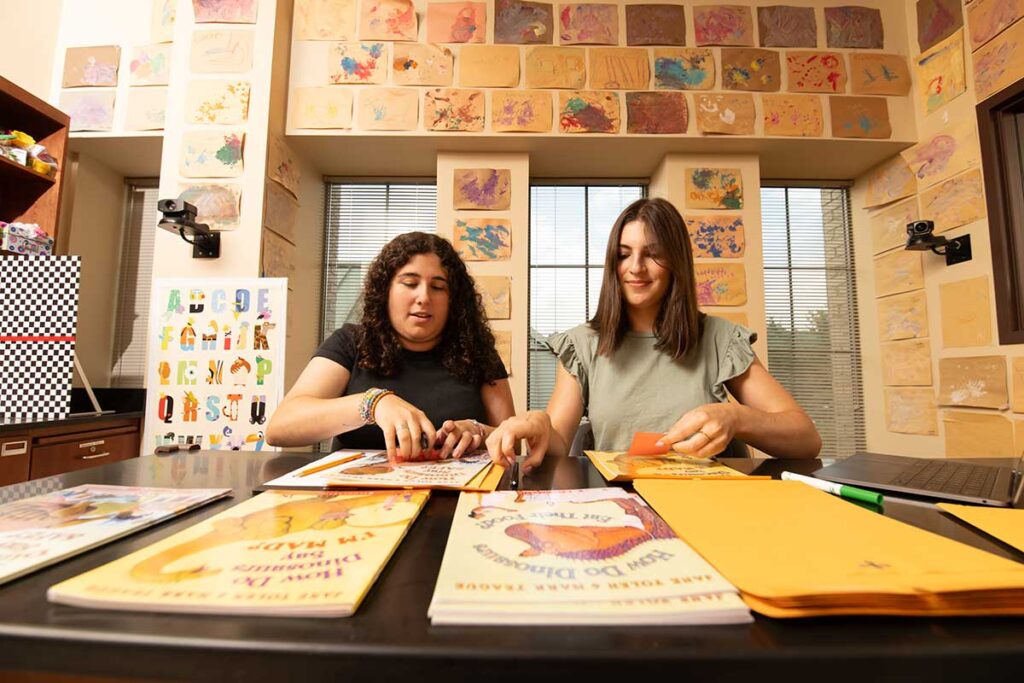
Samantha Montague ’26 (left) and Gabriela Pedulla ’26 (right) prepare packets of books to be mailed to grandparents and grandchildren participating in the study. | Photo by Adam Atkinson
From sharpening her intrapersonal and public speaking skills, to learning how to use survey and other advanced computer technology, to understanding how to work as part of a larger research team, are other rewards of being a part of the study that Katz says she’ll carry with her in her future career as a therapist for children and young adults. “I have friends at other universities who are not able to do any research at the undergraduate level, so to be able to work in this research lab as well as the Lafayette Neurodiversity Lab by the time I was a junior at Lafayette is incredible,” Katz says. “The faculty in Lafayette’s Psychology Department really care about their students, and I do not think this would have been possible without Lafayette’s focus on academic involvement, and the constant guidance and support of my professors.”
Montague, a psychology major who joined the lab in spring 2024, says the experience changed her perspective on the future: “At first, I was fixated on following a career in psychotherapy. Now, I’ve realized that I love working with young children, and I’ve started to consider school psychology as a potential career path.” Either way, she says, “the skills I’m gaining from doing research are extremely valuable, and ones I feel would be difficult to gain elsewhere. Being able to work in a research lab as an undergraduate student is an experience that is unique to Lafayette, since there are no graduate students to compete with for resources, and there are more opportunities to work firsthand with professors.”
The best part about summer research, Myers says, is that students get to see what it’s like to be fully immersed in a project full time—something that isn’t possible for them during the academic year. “I love seeing students blossom as researchers and take increasing ownership over the project.” Myers adds that the resources available at Lafayette—including lab space, technology, and programs like the EXCEL Scholars and Bergh Family Fellows—are what make these research opportunities possible for students and professors alike. “It makes a world of difference that the College has a great infrastructure in place to support research in this way,” she says.
As they continue the study over the summer and throughout next academic year, Myers and her student-researchers are looking forward to discovering their final results, and how they can potentially help families use digital media to improve their lives. “It is so rewarding to already hear from many participants that the study has had positive impacts on their relationships,” Katz says, “and it makes me excited to see what could happen once our research is published, and more people can have access to our work.”
